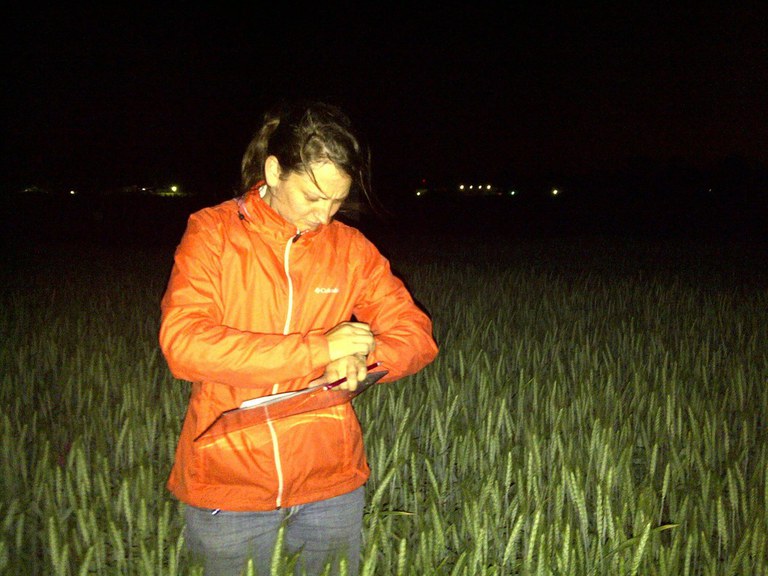Posted: December 5, 2013
Read a first hand account of Ariel's research interests and her time spent at CIMMYT in Central Mexico. Ariel is a Borlaug Fellow and Ph.D. Candidate in Entomology and INTAD.
As a very young undergraduate student, I took an introductory course in international agriculture and development in my second year, much like the Introduction to International Agriculture (INTAG 100) course offered at Penn State. Selfishly, as a student of the agricultural sciences, I had taken the class not because of my interests in global themes affecting agricultural, but because it was a class related to agriculture that met general education requirements. I had no idea when I enrolled that this course would become the one that would forever change my career path. Learning about Thomas Malthus, Dr. Norman Borlaug, international institutions researching themes relating agriculture to environmental sustainability, food security, and poverty alleviation…. these were all things that from then on become important aspects of my education at both the undergraduate and graduate level. Now as a doctoral candidate in the Department of Entomology, I am extremely fortunate in that our department offers students the opportunity to obtain a dual-title degree in International Agriculture and Development (INTAD). As the only university in the nation to offer such a program, this is ideal for me in that I can study the natural environment while learning about broad social issues, like global distribution of food products and factors affecting food insecurity globally.
Located in central Mexico, the International Maize and Wheat Improvement Center (CIMMYT) is one of the many institutions I hold in high regard due to that introductory international agriculture course I took so many years ago. As part of the Consultative Group on International Agricultural Research (CGIAR), CIMMYT researchers work on themes related to increasing yield and mitigating the effects of climate change in agricultural production, alleviating poverty, capacity building, and training of agricultural producers. Dr. Norman Borlaug, the noble laureate cited for saving over 1 billion people through his work on improved wheat varieties, conducted the bulk of his work at CIMMYT. As a scientist myself, I have had the opportunity this year to continue Borlaug's legacy in food security research at CIMMYT through the Borlaug Fellowship in Global Food Security. This fellowship has allowed me study the ground-dwelling arthropod communities in conservation agriculture in collaboration with Dr. Bram Goaverts and Dr. Nele Verhulst at CIMMYT.
Conservation agriculture--as a series of agronomic practices that reduce in field disturbances such as tillage, maintain crop residues to improve soil quality, and employ rotations in crops--is frequently looked at as a means to improve low-input agriculture and mitigate the effects of climate change, because it can help maintain soil moisture. By studying the arthropod communities in these systems, I can contribute to the body of knowledge related to the activities of important groups of arthropods, like herbivores causing economic damage, and their natural enemies. Each of these groups are affected by conservation agriculture in different ways, and by increasing our understanding of their activities, we can better plan our in-field management to potentially reduce chemical use or to improve biological activity for better nutrient cycling in soils.
I have been at CIMMYT since May, and I have just finished my fieldwork, collecting arthropod communities and looking at the role ants and other arthropods play in suppressing pest populations. Having just presented some preliminary results to CIMMYT staff, I know I have inspired at least a few people to think about the important role arthropods might play in the functioning of agroecosystems, and as a result, how this might impact agricultural production and food security. I am extremely excited about the trends I am seeing in my data so far, and I greatly look forward to working with this data to find other fascinating results. Thanks to the Borlaug Fellowship, I have had a unique opportunity to relate arthropod activity to food security, and I look forward to how this will help inform my future research. If it were not for the work of Dr. Norman Borlaug motivating me so many years ago, I would not be at CIMMYT today. And as a nerd, I am proud to say that research dreams do come true.
INTAD
Address
Melanie Miller Foster106 Agricultural Administration Building
University Park, PA 16802
- Email mjm727@psu.edu
- Office 814-863-0249
- Fax 814-865-3055
INTAD
Address
Melanie Miller Foster106 Agricultural Administration Building
University Park, PA 16802
- Email mjm727@psu.edu
- Office 814-863-0249
- Fax 814-865-3055


